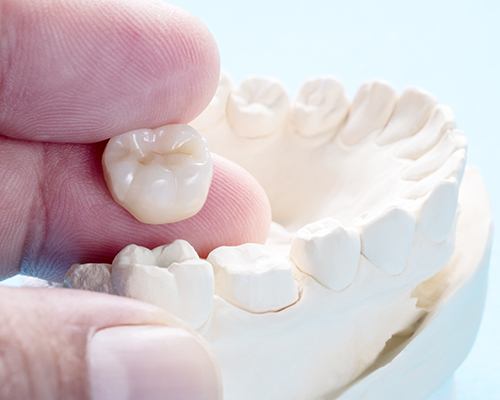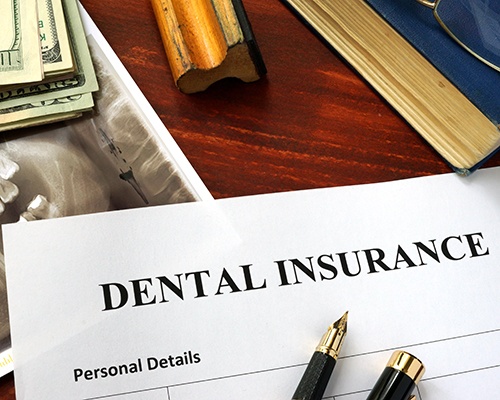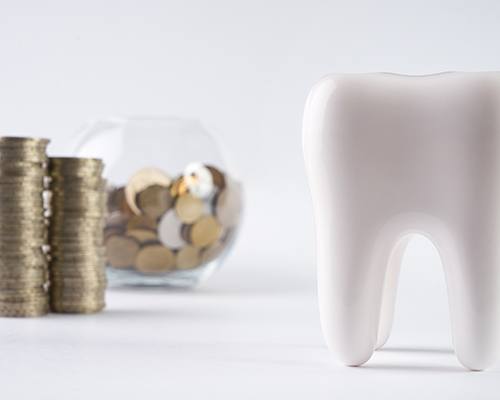Dental Crowns – Jenks, OK
Strengthen and Renew Damaged Teeth
The team here at Elwood Avenue Dental in Jenks always strives to help patients maintain their natural teeth if possible. One way in which we do that is through the use of high-quality dental crowns. These custom-made restorations have the capacity to strengthen and renew damaged teeth so they can continue to provide many years of reliable function. What exactly are dental crowns, and what is involved in the treatment process? Continue reading this page to find out, and get in touch with us when you are ready to book your consultation.
Why Choose Elwood Avenue Dental for Dental Crowns?
- Digital Impressions for Efficient, Comfortable Treatment
- Highly Skilled & Compassionate Dental Team
- Beautiful Results that Last for Many Years
What Is a Dental Crown?

A dental crown is a custom-made restoration that fits over the entire portion of a tooth that is visible above the gumline. Sometimes referred to as a “cap,” they are shaped to fit in comfortably with the natural nuances of your bite.
A crown’s purpose is to restore the strength, function, and appearance of a damaged tooth. They are often used to repair cracked teeth, strengthen teeth that have been treated by root canal therapy, and renew the shape of teeth that have been worn down by bruxism (grinding and clenching). They can also be used on top of dental implants to replace missing teeth.
The Process of Getting a Dental Crown

The dental crown process requires at least two appointments. During your consultation, we will answer your questions about the treatment and let you know what type of crown we recommend for you. We offer restorations made of Emax, porcelain, and zirconia, all of which are incredibly natural-looking. Gold crowns are also available.
Once we decide on a treatment plan, we will prepare your tooth. This may involve removing some enamel so it fits well beneath the crown. Then, we use our digital impression scanner to create a digital representation of your teeth that a dental lab will use to create your custom crown.
While the lab is working, you will wear a temporary crown to protect your prepared tooth. Once your permanent one is ready, we will verify its fit before cementing it into place.
Benefits of Getting a Dental Crown

Dental crowns come with numerous benefits. Here are a few examples:
- A crown can protect a damaged tooth and possibly spare it from extraction. This can save you money and protect the health of your jawbone.
- You can find relief from dental sensitivity.
- Crowns can look incredibly lifelike.
- A crown can give you a more harmonious, comfortable bite.
- Crowns are easy to maintain; in many ways, you can treat them just like natural teeth.
- With proper care, a crown can last for 10 years or longer.
- Crowns are carefully designed for each patient, so you can expect your restoration to be both comfortable and beautiful.
Understanding the Cost of Dental Crowns

Dental crowns have a lot to offer as a restorative treatment, and one of their major benefits is their incredible versatility. Your dental crown can be a lot of different things for different people, and while that makes them a very useful treatment it also means that it can be difficult to determine what the treatment will cost without meeting you first.
We’ll give you a complete estimate for what care will cost when we meet you in person, but before then here’s what you should know about the typical price of dental crowns.
Factors that Affect the Cost of Dental Crowns

Several factors influence the cost of dental crowns. The severity of dental damage and the need for additional procedures, such as root canals or placement over implants, can impact pricing. Additionally, the material used for the crown plays a significant role in determining its cost. We make our crowns from both tooth colored materials and porcelain; both materials have their benefits, and we’ll be able to give you a better sense of which of them you will best meet your needs.
It's essential for patients to prioritize quality over cost, as the longevity and comfort of their new crown are crucial for long-term oral health and satisfaction. Balancing your needs with your budget is a critical component of designing your dental crown.
Does Dental Insurance Cover Dental Crowns?

Yes, dental crowns are typically considered a major procedure and may have around 50% of their cost covered by dental insurance if deemed medically necessary. However, coverage varies depending on the insurance plan. It's advisable for patients to consult with their dental team to confirm specific benefits before undergoing treatment, ensuring transparency and clarity regarding financial responsibilities. Of course, we will be happy to help you in this regard.
Other Options for Making Dental Crowns Affordable

If it turns out that your dental insurance isn’t going to pay for your care, that doesn’t meant that you have to go without the restoration you need. We offer our patients a myriad of options that can allow them to make their care affordable.
For one, we have an in-house membership plan that can offer you substantial discounts on our services for a flat monthly fee, making it an excellent alternative to insurance. You might also want to pursue financing; we work frequently with CareCredit, which can allow you to split the cost of care across several months.
If you’re interested in any of these services, give us a call and we’ll be happy to talk to you about the financial options available to you.
Dental Crown FAQs
How Long Do Dental Crowns Last?
The amount of time that you can expect your dental crown to last will vary based on several factors, but in general you can expect your restoration to last between five and fifteen years. Some materials tend to last longer than others—what metal dental crowns give up in aesthetics, they tend to make up for in durability.
Their lifespan also has to do with how well you take care of your restoration. If you are rigorous with your dental hygiene and attend regular preventive appointments, you’ll see your restoration stick around for a long time to come.
Do Dental Crowns Get Cavities?
A dental crown itself cannot get a cavity; the materials that we make our restorations from are resistant to erosion and will therefore not suffer from tooth decay.
However, it is possible for the tooth underneath a dental crown to develop a cavity. In fact, it’s about as likely as a cavity on a tooth without a restoration on it. The point of a dental crown is to protect the areas of damage that are already on the tooth, not necessarily to prevent new ones from forming. For that reason, it’s still critically necessary to take care of a tooth that you’ve had treated before.
Does It Hurt to Get a Dental Crown?
Before you begin the dental crown procedure, we will numb the tooth completely to ensure your complete comfort. For that reason, there’s no reason to be concerned about pain involved with the dental crown procedure. If you’re nervous about the procedure, we also have sedation options available to you.
After the procedure is done, it’s common to feel a bit sensitive for a few days. This should be mild and short-lived, so OTC pain medicine is usually sufficient to get through the aftercare process. If you notice that sensitivity doesn’t face, you might want to give us a call so we can check that nothing has gone wrong.
Do Dental Crowns Feel Natural?
At first, it might feel weird to have something new in your mouth that wasn’t there before. However, dental crowns are made to be incredibly realistic and to fit easily in your mouth. The tooth-colored materials we use will be crafted to perfectly match your enamel, and the restoration itself will be molded to perfectly match the other teeth in your mouth.
For all of these reasons, you should be able to acclimate to your new restoration rather quickly. The crown will hardly even be noticeable, by you or by others.

